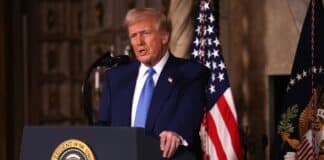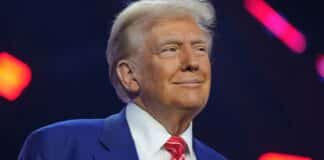Former President Donald Trump is seeking to postpone his hush money trial scheduled for March 25 until the Supreme Court rules on his claims of presidential immunity in another criminal case. Trump’s attorneys filed a request with Manhattan Judge Juan Manuel Merchan on Monday, asking for an indefinite adjournment of the New York trial until a resolution is reached in his Washington, D.C., election interference case.
Merchan has yet to make a ruling, but in a late Monday order, he criticized Trump’s legal team for missing a filing deadline and waiting until just 2½ weeks before jury selection to raise the immunity issue. The judge mandated that Trump’s lawyers and prosecutors must obtain his permission before making any further pretrial motions.
Trump asserts that he is immune from prosecution for actions alleged to have occurred during his presidency. His legal team argues that some of the evidence and acts in the hush money case overlap with his time in office and should be considered official acts.
The Supreme Court is set to hear arguments on April 25, a month after jury selection is scheduled to begin in Trump’s hush money case, which marks the first of four criminal cases he faces as he pursues the Republican presidential nomination.
The Manhattan district attorney’s office declined to comment, but prosecutors are expected to respond to Trump’s delay request in court filings later this week.
Trump initially raised the immunity issue in his Washington, D.C., criminal case, which alleges that he attempted to overturn the 2020 election results leading up to the January 6, 2021, Capitol riot.
The hush money case revolves around allegations that Trump falsified his company’s internal records to conceal payments to his former lawyer Michael Cohen, who facilitated hush payments to porn actress Stormy Daniels to suppress her claims of an extramarital affair with Trump.
Trump, who pleaded not guilty last year to 34 felony counts of falsifying business records, denies the encounter with Daniels and argues that the payments to Cohen were legitimate legal expenses, not part of any cover-up.
A federal judge rejected Trump’s assertion that the hush money indictment involved official duties, preventing the case from being moved to federal court. The judge concluded that the payments did not constitute official acts of the presidency.
While Trump’s lawyers appealed this decision, they withdrew the appeal in November with prejudice, indicating they couldn’t reverse their decision.
The issue of whether a former president is immune from federal prosecution for actions taken while in office remains legally untested. Prosecutors in the Washington, D.C., case maintain that no such immunity exists and that the actions Trump is accused of in the indictment do not qualify as official acts.
Although both the trial judge in Washington and a federal appeals court ruled against Trump, the Supreme Court’s decision to reconsider the matter has introduced uncertainty and delayed the federal case.






